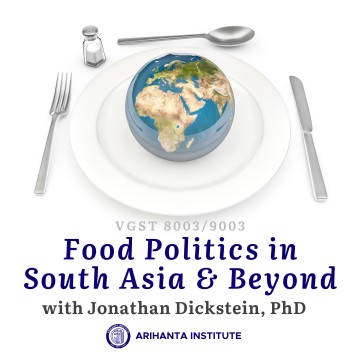Food Politics in South Asia & Beyond
Food Politics in South Asia & Beyond
Course VGST50036003
This course delves into the intricate dynamics of food practices, systems, and politics in South Asia, with a particular emphasis on India's diverse religious, regional, class, and caste groups. It aims to foster a nuanced understanding that food is never merely sustenance but serves as a potent vehicle for constructing and expressing individual, familial, regional, and even national identities, with profound social and often discriminatory consequences.
The course begins with an exploration of religious perspectives on food production, preparation, consumption, and commensality, focusing on dietary prescriptions and proscriptions in Jainism, Hinduism, Buddhism, and Islam. From there, the content transitions to contemporary issues, events, laws, and policies that illustrate how food is weaponized in projects of social demarcation and oppression. Key topics include the rise of vegetarian Hindu nationalism, the pure/impure dichotomy, gender and "women's work," colonial influence on production and consumption, the contemporary Westernization of South Asian foodways, “peasant” resistance movements, and the differentially-impactful ecological ramifications of increasingly industrialized food systems.
The course culminates with a brief discussion of specific gastropolitical debates in Central, East, and Southeast Asia, as well as in the South Asian diaspora in North America, providing a comparative and transnational perspective.
Upon successful completion of this class, students will be able to:
- Describe (with examples) how integral food is to identity formation.
- Locate significant features of regional food politics.
- Identify the intersections of religion, gender, race, class, and caste in conflicts around food production and consumption.
- Compare and contrast Jain, Hindu, Buddhist, Sikh, Muslim, and Christian foodways.
- Discuss the impacts of colonialism, Westernization, and industrialization on South Asian food systems.
Learning Area
 Social Justice
Social Justice Instructor
 Jonathan Dickstein, PhD
Jonathan Dickstein, PhD
Jonathan Dickstein, PhD, the Tirthankara Shreyansanath Endowed Assistant Professor of Jain and Vegan Studies at Arihanta Institute, specializes in South Asian Religions, Religion and Ecology, and Comparative Religious Ethics. He received his doctoral degree in Religious Studies from the University of California, Santa Barbara, where he wrote his dissertation on ancient Indian animal taxonomies and their relevance for religious ritual and dietary practice. Jonathan’s current work focuses on Jainism and contemporary ecological issues, and accordingly extends into Critical Animal Studies, Food Studies, and Diaspora Studies.
Jonathan has published in a wide array of interdisciplinary journals on topics such as veganism and politics, yoga and diet, Jain veganism, and the ethic of nonviolence (ahiṃsa). Jonathan considers himself a scholar-practitioner, having spent many years not only in libraries but also in public advocating for justice for both humans and nonhumans alike.
Jonathan has published in a wide array of interdisciplinary journals on topics such as veganism and politics, yoga and diet, Jain veganism, and the ethic of nonviolence (ahiṃsa). Jonathan considers himself a scholar-practitioner, having spent many years not only in libraries but also in public advocating for justice for both humans and nonhumans alike.
Enrollment Options
14-DAY FREE TRIAL
- Free, unlimited access to our self-paced courses for 14-days.
- Already used your free trial? Enroll in our Monthly or Annual Membership options at anytime and continue learning immediately!
MONTHLY MEMBERSHIP
- $45 USD / Month
-
Immediate access to course
#### | Name. - Unlimited access to our live and self-paced courses for one month, with month-to-month auto rollover.
- Excludes graduate seminars, language courses, and courses hosted on partner platforms.

